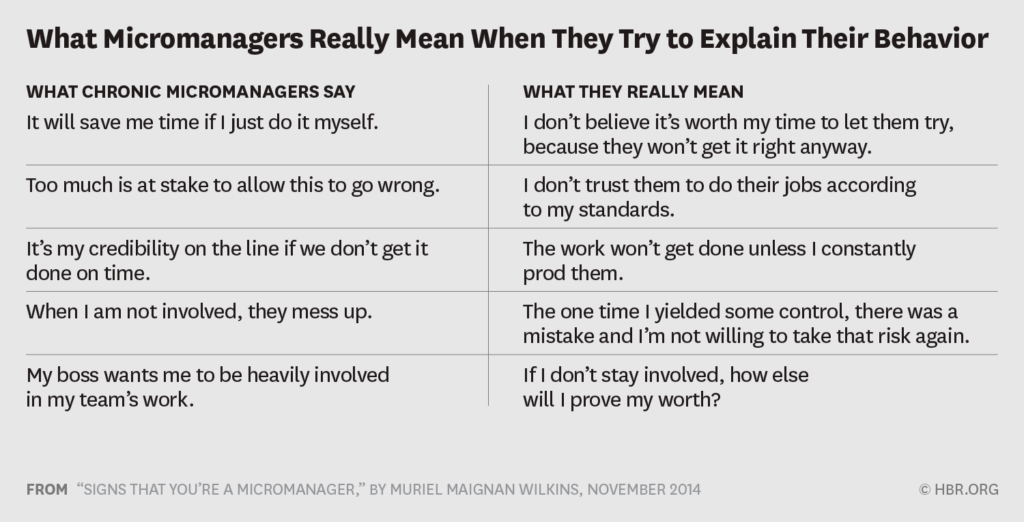“Just do it my way and we’ll get along fine.” -Boss you considered leaving for another job
You were hired into your current role over many other qualified candidates because of your experience, expertise, and ability to get the job done. And now you have a boss who wants to know what you are doing at all times, and may even have you questioning your own abilities, as only their way seems to be “right”.
If this sounds like you, you likely have a micromanager for a boss. If not addressed, this toxic relationship could affect your confidence, your health, and your career.
Are micromanagers evil?
“There are two ways to have the tallest building in town. One is to tear everyone else’s building down, and the other is to build your building taller.” -Jim Rohn
Though you might disagree, micromanagers aren’t really evil at heart, and there are a lot of great leaders who have “kicked the micromanaging habit” as they grew in their career. Micromanagers are generally not confident in their own abilities as a leader and project that onto everyone else. They complain about all things big and small. If they can find something wrong with someone else’s work, it reinforces their view that they alone have the right answer, and thus must micromanage.
Micromanagers focus on completing tasks, not on developing leaders. Rather than mentor or coach you, they hold on tight to their knowledge because it’s the currency they deal in that helps them feel safe. If they gave it away, what use would they be?
One coaching client of mine believed they were doing their team a favor by tightly controlling the “quality” of their work through constant check-ins and deep dives into how they were going about their tasks. Unexpectedly (for them) team morale was at an all-time low. After several coaching conversations they realized that the stress they felt about “quality” was connected to a belief that doing things “right” was more important than having space for innovation and creativity. They came to understand that learning includes trying a lot of things that don’t end up working as we expected, and it also leads to new and better ways of doing things that bring even greater success.

What do micromanagers really want? They want success and quality, which we can likely all agree on. However, they are exclusively focused on the success and quality of tasks being completed where “quality” is measured by how they would accomplish a task. If this is indeed your boss, let’s look at ways you can both give yourself some breathing room, and to also help them learn and grown as a leader.
Proactive updates
If you don’t already have a weekly 1-on-1 with your boss, ask to create one. The opportunity here is for you to give frequent (but no too frequent) updates to help them feel informed and comfortable about how your work is progressing. Let them know about upcoming projects or events so that they aren’t surprised, and focus on the results you are achieving.
Micromanagers may not immediately see the need for a weekly 1-on-1, but if positioned as an opportunity to stay in sync with regard to results they may more easily understand the value. Other ways to leverage a weekly 1-on-1 with micromanagers can be discussions about:
- Opportunities for delegation – What would free up time for your boss to think more strategically?
- Setting healthy boundaries – What’s a reasonable timeframe to respond to after-hours emails?
- Defining clear expectations – What is your role and what’s expected performance for promotion?
- Opening up two-way feedback – What’s going well and what needs to change for both of you?
Ask your boss about their big picture concerns and goals – what are they? Even if you think you already know, this level of conversation can help you both find a place of agreement from which further conversations can emerge, focusing on results rather than how the work gets done.
This is the opportunity to remind them gently and firmly that you were hired as an expert, which includes knowledge and experience, as well as the drive to learn and grow. Ask for feedback, both what they like about your work and what they would change. And offer them sincere appreciation for the things they do well in supporting you, as well as suggesting ideas that you believe would increase your engagement and effectiveness, as well as increasing team results.
Asking for the opportunity to learn
“Someone who needs to control their environment is someone who is motivated by fear.” -Tina Gilbertson
Micromanagers are hugely afraid of losing, and that fear has them holding on so tightly to the details that their teams lose motivation. Some might even literally lose their team as a result. One thing micromanagers need most is the skill of effective delegation. Effective delegation can harness their drive for quality into a shared team success.
What does effective delegation look like, and how can you help your boss develop this skill? First and foremost is to begin with the end in mind. Here are some questions you can talk about with them to get clarity:
- What does success look like for your boss in the tasks you are doing?
- What’s the timetable, budget, and available resources?
- What obstacles might get in the way?
- What core values are most important to them?
- What areas are ripe for innovation?
- What are you personally a looking to learn from taking on a specific project?
Notice we are NOT asking: “How would you do this?” Your micromanaging boss might tell you anyway, and our goal here is for them to gain enough clarity around the intended outcome that they can begin to let go of specifically how they would do something. Remember, micromanagement is a habit and like all habits can be grown out of when the opportunity and motivation present themselves.
What will you experiment with in the name of helping both you and your boss find greater success and satisfaction within your team?






